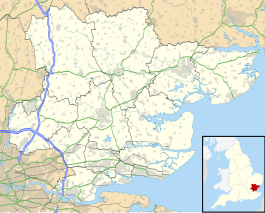Roding Valley tube station
| Roding Valley |
|
|---|---|

Station entrance, northern side
|
|
|
Location of Roding Valley in Essex
|
|
| Location | Buckhurst Hill |
| Local authority | Epping Forest |
| Managed by | London Underground |
| Number of platforms | 2 |
| Accessible | Yes |
| Fare zone | 4 |
| London Underground annual entry and exit | |
| 2012 |
|
| 2013 |
|
| 2014 |
|
| 2015 |
|
| Railway companies | |
| Original company | London and North Eastern Railway |
| Post-grouping | London and North Eastern Railway |
| Key dates | |
| 1903 | Track laid (GER) |
| 1936 | Opened (LNER) |
| 1947 | Closed (LNER) |
| 1948 | Opened (Central line) |
| Other information | |
| Lists of stations | |
| WGS84 | 51°37′01″N 0°02′38″E / 51.61694°N 0.04388°ECoordinates: 51°37′01″N 0°02′38″E / 51.61694°N 0.04388°E |
|
|
|
Roding Valley is a London Underground station situated in Buckhurst Hill in the Epping Forest district of Essex immediately to the north of the boundary with Greater London (the London Borough of Redbridge). The station is on the Hainault loop of the Central line between Chigwell and Woodford stations. However geographically it is midway between Woodford and Buckhurst Hill stations. It is located between Station Way and Cherry Tree Rise (off Buckhurst Way). Since 2 January 2007, the station has been in Travelcard Zone 4.
With around 260,000 passenger journeys recorded in 2014 (or about 712 passengers a day), Roding Valley is the least-used station on the entire Underground network. This is because it has a very small catchment area. and nearby Woodford and Buckhurst Hill provide vastly superior train services at all times of the day.
It was originally named "Roding Valley Halt" (though while the full name appeared on tickets and timetables, the word "Halt" appeared on only some of the station signage), and was opened to serve new housing developments between Buckhurst Hill and Woodford. It was named after the River Roding which is close by, to the east. The track rises towards Chigwell and crosses the Roding over an impressive viaduct. Woodford Junction, where the Hainault branch leaves the main Central line to Epping, is very close to the station — Roding Valley's platforms are visible from the train in either direction between Woodford and Buckhurst Hill (on the left of the train towards Woodford).
Roding Valley station has a very small catchment area, which may explain its low usage. To the NE, E and SE is the undeveloped flood plain of the river Roding. A short distance to the N is Buckhurst Hill station. To the NW is an open space, while the areas to the SW and S are served by Woodford station, which has a better train service.
The tracks through Roding Valley were opened on 1 May 1903 by the Great Eastern Railway (GER) on its Woodford to Ilford line (the Fairlop Loop). The station was not opened until 3 February 1936 by the London & North Eastern Railway (LNER, successor to the GER).
...
Wikipedia

